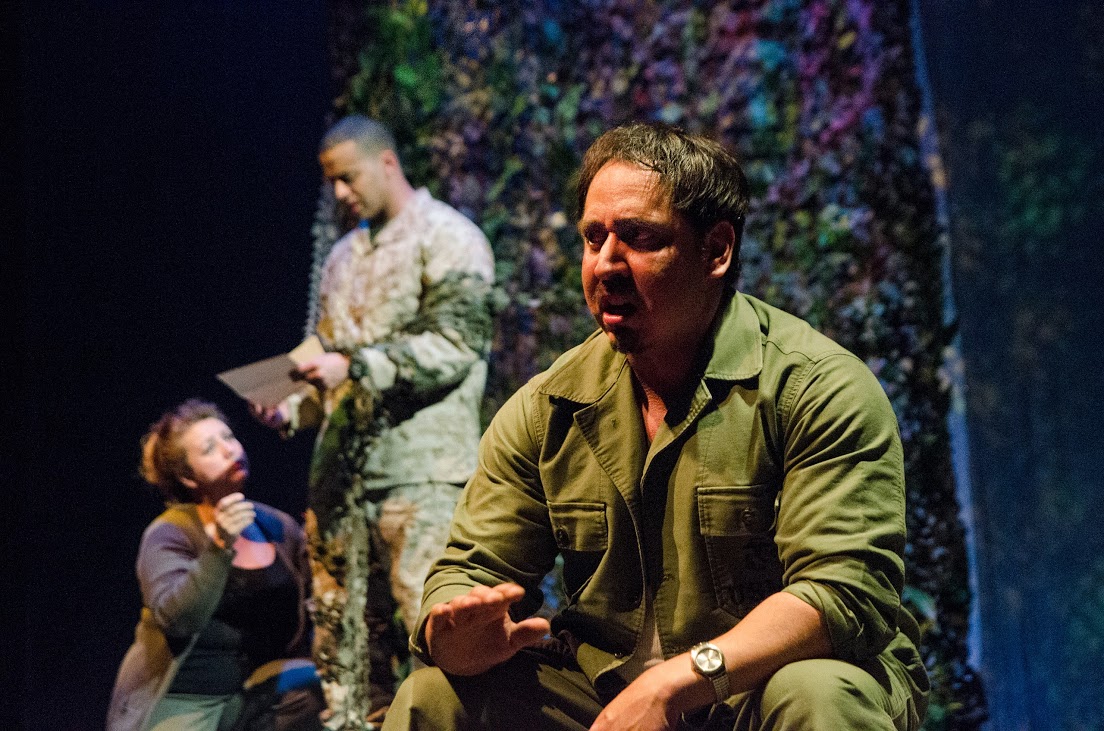
22 Mar Tall Tales: “Elliot, A Soldier’s Fugue,” Reviewed
Denver’s Curious Theatre Company’s now featuring “Elliot, A Soldier’s Fugue,” through April 23. Tickets here.

Antonio Mercado in Curious Theatre Company’s “Elliot: A Soldier’s Fugue.”
War is “over there.”
It comes back to us in an odd fashion, in meaningless glimpses—a returning veteran being honored at the ballpark, for instance, as he wears the hometown jersey and beams a smile. Or an awkward “how did you feel when you got hurt?” interview on the TV news.
We are insulated from it. And yet, for those of a certain age, it seems we’ve been at war for decades—a blur from Korea to Vietnam to Iraq to Afghanistan and back to Iraq and now ISIL (ISIS) with a bunch of other minor conflicts thrown in, from Grenada to Libya.
War is intertextual. Story is intertextual. Shooting at someone? For the first time? What else would you think but this is really happening. War goes from theory to the moment, to now.
“Elliot: A Soldier’s Fugue,” written by Quiara Alegria Hudes and being produced by the Curious Theatre Company through April 23, tasks itself with finding the humanity in the interconnected experiences of a family of soldiers from one war to the next to the next. In this case, Korea, Vietnam and Iraq. (“Elliot” was first produced a decade ago.) Elliott is today’s soldier. His “Pop” fought in Vietnam; his “Grandpop” in Korea. The fourth character in this sparse, sharply-hewn play is Ginny, who served as a nurse in Vietnam and is Elliott’s mother.
“Elliot” is dream-like. Stories come in fragments. The scraps have been stored in boxes and buried—nearly thrown away. The raw emotions have been tucked away, somehow, and justified or swallowed up by time. Grandpop comes across as the most melancholy. He brought a flute with him to Korea and uses music as analogy. Pop’s memories are still fresh. Elliot is now; he might go back.
There are things that happen “over there” that, well, how could you explain? Who would understand? They’ve been through it. Survivors endure the wounds, mental and physical. The rest of us, whether reading the newspaper or sitting in the theater, wonder—what must that be like? Or do we wonder at all?
“Elliot” rotates point of view, allowing echoes across the generations. In some cases, the stories overlap. The play ends at the beginning, each of the three soldiers shipping off to war—a few special items the only that distinguishes one mission—and one duffel—from the next.
“Elliot” is a unique piece of theater. It takes full advantage of the stage. This wouldn’t work in any other form (film or book, for instance). But it comes across as one-note. (Maybe that’s the point.)
Once the basic premise is presented, once we got the relationships and the concept, it doesn’t advance. This may be the play’s “fugue” style, interplaying images (matching wounds, matching commentary) from one war to the next, but the play seemed to stay up there on the stage. The conflict is internal. We are invited, in a way, but aren’t compelled to connect. From what I could discern, the play did nothing to take advantage of the fact that the soldiers had Puerto Rican heritage—and I thought a lot could be done with that.
Again, Curious comes through with snazzy, evocative stage. The lighting (Richard Devin) is stunning. The sound (Brian Freeland) is terrific, right down to a snippet of Bob Dylan wafting in from the distance. The acting is uniformly strong and the casting was terrific—these four belong together, as they should. The direction (Chip Walton) kept the flow moving as much as it could, especially around one longish monologue that simply asks the audience to “sit and get this information.”
Clearly, Hudes can write. I admired the overall style, which veered clear of the war-themed tropes. The next play in this cycle (“The Elliot Plays”) is “Water by the Spoonful” and it won the Pulitzer Prize. That show comes to the Curious in September and then the third play, “The Happiest Songs Plays Last,” comes early in 2017. In all, it’s interesting to take this risk. I think everyone who sees “A Soldier’s Fugue” will be compelled to see how the story moves in the next two installments.
Editor’s note: Telluride Inside… and Out’s regular column, Tall Tales, is so named because contributor Mark Stevens is one long drink of water. He is also long on talent. Mark was raised in Massachusetts. He’s been a Coloradoan since 1980. He’s worked as a print reporter, national news television producer, and school district communicator. Mark is the author of the Allison Coil Mystery Series—Antler Dust (2007), Buried by the Roan (2011), Trapline (2014) and Lake of Fire (due out in September, 2015). The series is set in the Flat Tops Wilderness in Western Colorado. Trapline won the 2015 Colorado Book Award for best mystery and the 2015 Colorado Author League award for best genre fiction. Mark Stevens’ new Alison Coil mystery, Lake of Fire, was published this year.



Sorry, the comment form is closed at this time.